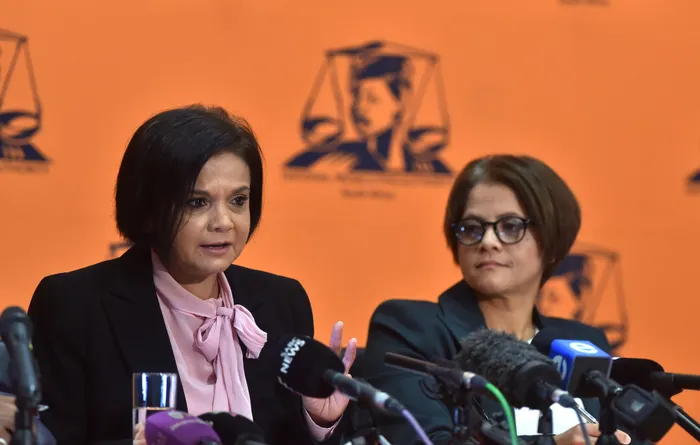Outcry over lack of clarity in appointment of the next National Director of Public Prosecutions

ADVOCATES Shamila Batohi and Hermione Cronje at a media briefing at the National Prosecuting Authority (NPA) offices in Silverton. Batohi will vacate her office as National Director of Public Prosecutions in January while Cronje left the NPA a couple of years ago.
Image: Bongani Shilubane/African News Agency/(ANA).
The former head of the National Prosecuting Authority’s (NPA’s) Investigating Directorate, Advocate Hermione Cronje, has called on civil society and anyone involved in the National Dialogue process launched on Friday to “start a groundswell or chorus” for urgent action to be taken regarding the new process of appointing the next National Director of Public Prosecutions (NDPP).
This was part of Cronje’s concluding remarks during a webinar jointly hosted by the University of the Western Cape and the Dullah Omar Institute for Constitutional Law, Governance and Human Rights on Thursday, 14 August.
She said President Cyril Ramaphosa has to be confronted to explain “why the inaction, what is he doing until November” when he is expected to make announcements regarding the new selection process.
She warned that “we practically have already run out of time” since the current NDPP, Advocate Shamila Batohi, has to vacate her office in January next year.
“As things stand now, we are told that by November this dilemma that the president has about the constitutionality of the appointment process (currently being proposed or formulated) may be resolved,” Cronje said.
She said Ramaphosa has to be held to the undertaking he made that he would ensure that the next NDPP is subjected to a transparent, consultative and fair process.
No action, clarity
Lamenting the lack of action and clarity on an issue “that everybody agrees on” that there needs to be a new proper process, Cronje said at least Ramaphosa should follow a process similar to the one adopted when Batohi was appointed. That way “it’ll be not going backwards if not going forward at a rapid pace”.
Responding to a question about whether there was “political will” to conduct the appointment properly and to help make the prosecuting authority more efficient to fight crime, Cronje said politicians often say the right things but “what they do is what counts”.
Questions have been raised as to whether Ramaphosa was considering extending Batohi’s tenure beyond January, but Justice and Constitutional Development Minister Mmamoloko Kubayi denied there were such moves afoot.
Kubayi, responding to parliamentary questions from DA MP Damien Klopper and EFF MP Carl Niehaus a couple of weeks ago, explained that an NDPP must retire at the age of 65. She explained that the provision was “preemptory”, thus Batohi’s tenure could not be extended after turning 65.
The minister asked that Ramaphosa be given time to determine the new appointment process.
Extension talks denied
Kubayi denied there had been discussions or moves between her and Batohi on possibly extending her term.
The first NDPP appointed via a transparent and consultative process, there were high hopes when Batohi took office back in 2018. However, she has recently come under fire for some questionable performance by state prosecutors and the lack of convictions in high-profile crime and corruption cases.
Ramaphosa also raised the hopes of the nation labouring under high crime and corruption that a proper process would be legislated for all future NDPP appointments, but so far there has not been any legislation formulated, leaving citizens and civil society in the dark about the process to be followed as time runs out.
In her reply to parliamentary questions, Kubayi emphasised that it was Ramaphosa’s prerogative as president to appoint the next NDPP and pleaded for patience until his announcement in November.
Related Topics: